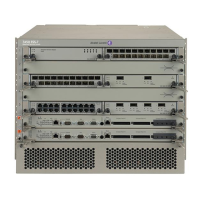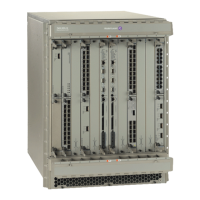HSMDA QoS Model
778 Quality of Service Guide
Figure 50: High and Low RED Slopes
HSMDA Slope Policy MBS Parameter
Unlike standard queues, HSMDA queues do not have a configured maximum buffer size
(MBS) parameter. Instead the high and low RED slopes are used for all queue congestion
control functions by the queue. The system uses an MBS value to define how much buffering
an HSMDA queue may use, but it is contained in the HSMDA slope policy. The slope policy
uses the configured MBS value to provide context for the slope parameters which are defined
as percentages of MBS.
HSMDA Slope Policy Slope Parameters
Each slope in the slope policy is defined by three points; the starting-depth, slope maximum-
depth and the slope maximum-discard-probability. Only three points are required since the
starting-depth value implies a starting-discard-probability of zero percent. The starting-depth
defines at which queue depth the slope starts to rise from zero. The maximum-depth point
defines the queue depth where the slope ends and goes straight to 100%. The maximum-
discard-probability defines the how high the slope rises from zero before going straight to
100% at the maximum-depth point.
If the starting-depth and maximum-depth percentages are equal, the system performs a simple
drop tail; the discard probability slope is essentially non-existent in this case.
The system takes the configured slope parameters and uses them to calculate the HSMDA
internal slope definitions:
OSSG158
Queue Depth Utilization
Low
Slope
High
Slope
Discard
Probability
0%
0
P=1
100%
